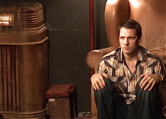When William Faulkner put us inside the head of an idiot in section one of his 1929 novel, The Sound and the Fury, it was a radical stylistic choice. An early American practitioner of the stream-of-consciousness style, introduced by such European modernists as James Joyce and Virginia Woolf, Faulkner went one step further than Joyce and Woolf by his choice of an idiot narrator, one whose brain was even more chaotic than the ordinary, disorganized mental stream of most humans.
What the group Elevator Repair Service has created at New York Theatre Workshop is the stage version of such an experience. We are inside the brain of Benjy Compson, the retarded youngest son in an old Southern quasi-aristocratic family. ERS has titled this play The Sound and the Fury (April Seventh, 1928) in order to locate it in time on the day of Benjy's thirty-third birthday. But time for Benjy has no particular meaning, and so many of his days intrude on this one, and we actually experience certain significant events that range over his life from about the age of three.
The text is credited to Faulkner, while the group itself is cited under the term "created by." Apparently it is a group creation, developed during a workshop residency at Dartmouth College, followed by more work at NYTW, and directed by John Collins. It is certainly experimental theatre. And it packs a theatrical wallop.
Twelve actors play 27 roles, including various members of the Compson family and of the family of black servants who tend to their needs, particularly those of the four Compson children: Quentin, Caddy, Jason, and Benjy. Part of the mental fragmentation of Benjy's perceptions is captured by non-traditional role-casting, both racially and gender-wise.
Benjy is for the most part played by the brilliant Susie Sokol, a diminutive actress, who manages to express through body movements and facial expressions Benjy's confusions and desires. The black actor Greig Sargeant plays the white Mrs. Compson as well as the long-suffering black servant Dilsey, Mr. Compson, and a golfer. All of the roles are fluid, with actors taking on parts and then shedding them for others, rather like in dreams. Mrs. Compson, for instance, can be white or black or male, but always she's complaining, and ill, and demanding of peace.
What stays solid is the set, a large realistic room with overstuffed chairs, a dining table, an upright radio, floor lamps, etc. This is the Compson home, where emotional battles are raging, melodramas brewing, and where, in the midst of adult secrets, the children are endlessly playing and quarreling. Rebellions are staged, and everyone has his own agenda, right down to Luster, the 14-year-old black boy who tends to the 33-year-old Benjy. Luster has lost a quarter and spends most of the day looking for it, since otherwise he can't go to the traveling variety show in town that night. Benjy is there, often at stage center, to witness it all.
Having read the Faulkner novel some years back, I possess a basic knowledge of the family and their convoluted issues. I'd be curious how someone not familiar with the novel would respond to this production. It may too closely approximate the chaos of Benjy's consciousness. The sensory overload that he no doubt experiences is heightened at times by loud radio music, characters breaking into odd mechanistic dances, and a sense of menace sometimes lurking on the edges of a scene. There is much verbal repetition, and the children are often resisting the demands of each other as well as of the adults. So one asks: to what end?
What is Elevator Repair Service trying to achieve? It would seem that they are performing a kind of ambitious theatrical exercise: to bring an experimental novel to the stage, to jump from one medium to another, to cross the line from pure narrative to stage action. As such it works. It does illuminate Faulkner. But it takes more than two and a half hours, and as time passes the repetitions grow more tedious. It is story theatre for grown ups. By using only the Faulkner text, ERS misses the opportunity to put it into another context, to slice into the text with a contemporary perspective. Nonetheless, for hardcore Faulkner fans, they provide an opportunity to have one hell of an acting out of this classic work. What emerges is almost an opera, sometimes lyrical, and they do respect the words. So catch it before it closes June 1.

